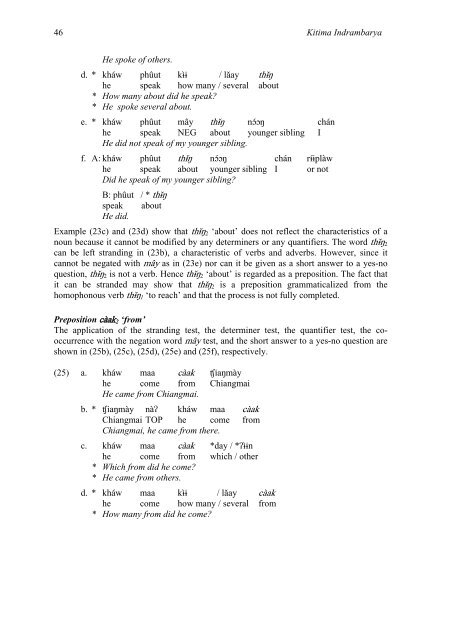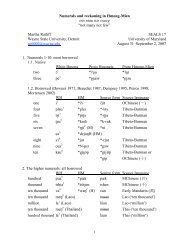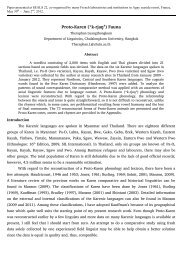proto-southwestern-tai revised: a new reconstruction - seals 22
proto-southwestern-tai revised: a new reconstruction - seals 22
proto-southwestern-tai revised: a new reconstruction - seals 22
You also want an ePaper? Increase the reach of your titles
YUMPU automatically turns print PDFs into web optimized ePapers that Google loves.
46 Kitima Indrambarya<br />
He spoke of others.<br />
d. * kháw phûut kɨ̀ɨ / lǎay thɨ̌ŋ<br />
he speak how many / several about<br />
* How many about did he speak?<br />
* He spoke several about.<br />
e. * kháw phûut mây thɨ̌ŋ nɔ́ɔŋ chán<br />
he speak NEG about younger sibling I<br />
He did not speak of my younger sibling.<br />
f. A: kháw phûut thɨ̌ŋ nɔ́ɔŋ chán rɨ́ɨplàw<br />
he speak about younger sibling I or not<br />
Did he speak of my younger sibling?<br />
B: phûut / * thɨ̌ŋ<br />
speak about<br />
He did.<br />
Example (23c) and (23d) show that thɨ̌ŋ2 ‘about’ does not reflect the characteristics of a<br />
noun because it cannot be modified by any determiners or any quantifiers. The word thɨ̌ŋ2<br />
can be left stranding in (23b), a characteristic of verbs and adverbs. However, since it<br />
cannot be negated with mây as in (23e) nor can it be given as a short answer to a yes-no<br />
question, thɨ̌ŋ2 is not a verb. Hence thɨ̌ŋ2 ‘about’ is regarded as a preposition. The fact that<br />
it can be stranded may show that thɨ̌ŋ2 is a preposition grammaticalized from the<br />
homophonous verb thɨ̌ŋ1 ‘to reach’ and that the process is not fully completed.<br />
Preposition càak2 ‘from’<br />
The application of the stranding test, the determiner test, the quantifier test, the cooccurrence<br />
with the negation word mây test, and the short answer to a yes-no question are<br />
shown in (25b), (25c), (25d), (25e) and (25f), respectively.<br />
(25) a. kháw maa càak ʧiaŋmày<br />
he come from Chiangmai<br />
He came from Chiangmai.<br />
b. * ʧiaŋmày nàʔ kháw maa càak<br />
Chiangmai TOP he come from<br />
Chiangmai, he came from there.<br />
c. kháw maa càak *day / *ʔɨ̀ɨn<br />
he come from which / other<br />
* Which from did he come?<br />
* He came from others.<br />
d. * kháw maa kɨ̀ɨ / lǎay càak<br />
he come how many / several from<br />
* How many from did he come?





